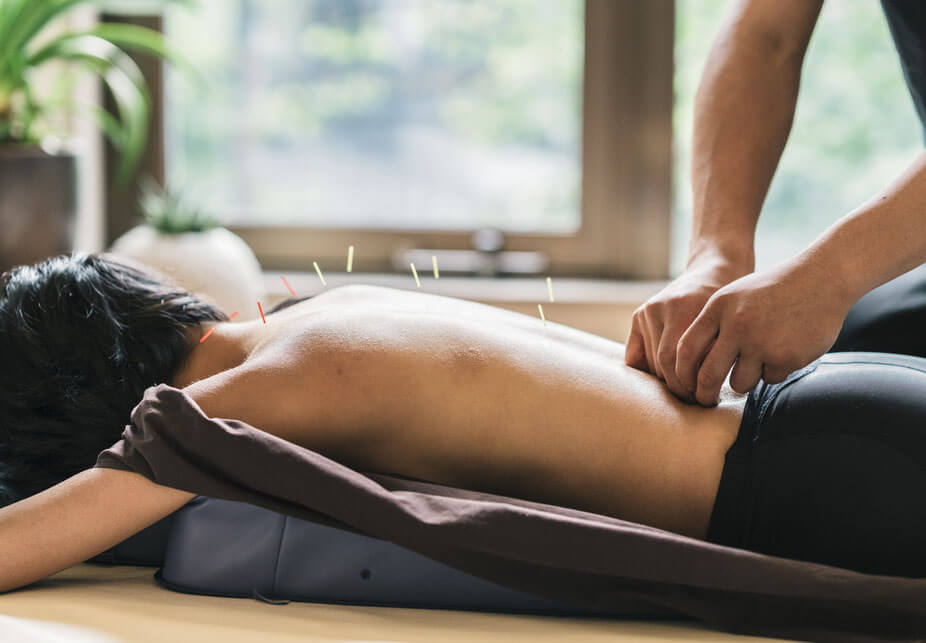Chronic pain is something that affects millions of people every day. It can differ in severity, causes, and occurs in different parts of the body. Although it may appear in waves, the discomfort will last from months to years and mostly likely impair the daily life of sufferers. Fortunately, many treatment options exist to relieve some of the pain, such as acupuncture. But how effective is acupuncture for chronic pain?
Acupuncture has been around since 6000 BC, and only recently has modern science caught up to realize its efficacy as a treatment option. Not only does acupuncture work to address many health conditions including insomnia and anxiety, but it has also been found to have high effectiveness for chronic pain.
Are you interested to see how it can work for you? In this article, we explore more about the effectiveness of acupuncture for chronic pain.
How Does Acupuncture Work?
Acupuncture has always been considered helpful in combating various ailments. As a traditional practice, it has survived millennia of changes in the surrounding world, simply due to its consistent efficacy. Although many credit Chinese medicine for its existence, there’s new evidence suggesting that its roots go back to the Neolithic period.
The practice of acupuncture revolves around one simple goal: unblocking the “qi”, which is said to be the cause of health issues. In other words, professionals insert filiform needles through the skin to relevant pressure points and leave them in place for at least 10 to 20 minutes. Western medicine explains this practice as stimulating nerves, muscles, and connective tissues to increase the production of natural painkillers in your body. The result? A noticed reported pain improvement.
It’s true that there is still a lot of scepticism on how helpful acupuncture is for chronic pain. For example, there is a lot of discussion about the possibility of people with low blood pressure to have acupuncture to raise it, as well as the opposite for people who have high blood pressure, but conclusive evidence still does not exist to definitely state this.
Is Acupuncture Helpful?
 So, is acupuncture helpful in addressing chronic pain?
So, is acupuncture helpful in addressing chronic pain?
As heavily debated as the treatment may be, the scientific belief in acupuncture efficacy isn’t just theoretical. There are many studies supporting what the rest of the world has known for countless generations: the effectiveness of acupuncture in treating various ailments can’t be written off by the ‘placebo effect’.
In a 2015 meta-analysis of studies involving acupuncture efficacy and chronic pain, the scientists conducted 39 trials involving 20,827 patients. Comparing the control and experimental groups, the placebo effect couldn’t withstand as the reason for the improved condition of the patients who underwent acupuncture. In fact, the effects of acupuncture on chronic pain also proved long-lasting, with the benefits spanning at least 12 months post-treatment.
Given acupuncture proved its effectiveness across these many clinical studies, the authors concluded that it’s a reasonable option in treating chronic pain, and even called for additional research to learn how to best incorporate it into medical treatment.
More research exists that explores the effectiveness of acupuncture in dealing with not only chronic pain, but also associated conditions:
Chronic pain and depression
When managing both chronic pain and depression, your treatment options become somewhat limited and not as effective. Thankfully, a 2020 study saw the value of acupuncture in effectively managing both health issues. 535 patients with chronic pain and depression were recruited to see if acupuncture can work as an alternative treatment option through a randomised controlled trial. Their conclusion? Acupuncture works better than medicinal therapy and doesn’t come with the same potential for side effects.
Chronic neck pain
In a meta-analysis involving 14 studies, researchers found that acupuncture held significant short-term effectiveness in the treatment of chronic neck pain, prompting the need for more research into long-term efficacy.
Acupuncture and chronic lower back pain
According to the Kaiser Permanente Washington Health Research Institute, acupuncture reduces the intensity of a variety of chronic pain conditions for patients. This helps them better fulfill their daily activities and maintain more fulfilling lives. This is prudent and useful information because, in their opinion, western medicine doesn’t yet have an effective treatment for chronic back pain, in particular.
You’ll notice that aside from acupuncture efficacy, they also prove that it’s a low-risk treatment option compared to taking medication. But this is something that we’ve already known for many years. As early as 2004, researchers determined that the risks of side effects associated with acupuncture are much lower than with common medical treatments. Some of them can even be avoidable by choosing a reputable acupuncturist!
Does the Effectiveness of Acupuncture for Chronic Pain Extend to Dry Needling?
Acupuncture or dry-needling may be an appropriate treatment option depending on the results you want to achieve. Both target certain points of your body to relieve pain, but that’s where the similarities end. While dry-needling services can ease muscular discomfort, it doesn’t have the same effectiveness for chronic pain.
Neither is necessarily ‘better’ than the other, but between the two, acupuncture has science-backed evidence of being helpful in the management of chronic pain. So, if that’s what you’re looking to treat, then your best course of action may be to pursue professionally offered acupuncture.
Is Acupuncture a Helpful Alternative to Pain Medication?
As we have discussed, the various side effects of taking pain medication, as well as the risks of building a dependency over extended usage, places this course of treatment as the non-preferred option for many. Instead, acupuncture is strongly being considered the go-to choice for sufferers to manage their chronic pain.
If you would like to learn more about the effectiveness of acupuncture for chronic pain, as well as how this course of treatment could help improve your daily life, contact the team at BodyMotion Physio today by calling (03) 9873 3333.
References:
Van Hal M, Dydyk AM, Green MS. Acupuncture. [Updated 2021 Jul 31]. In: StatPearls [Internet]. Treasure Island (FL): StatPearls Publishing; 2021 Jan-. Available from: https://www.ncbi.nlm.nih.gov/books/NBK532287/
Kelly RB, Willis J. Acupuncture for Pain. Am Fam Physician. 2019 Jul 15;100(2):89-96. PMID: 31305037.
Yang J, Chen J, Yang M, Yu S, Ying L, Liu GJ, Ren YL, Wright JM, Liang FR. Acupuncture for hypertension. Cochrane Database Syst Rev. 2018 Nov 14;11(11):CD008821. doi: 10.1002/14651858.CD008821.pub2. PMID: 30480757; PMCID: PMC6516840.
Vas J, Aguilar I, Perea-Milla E, Méndez C. Effectiveness of acupuncture and related techniques in treating non-oncological pain in primary healthcare–an audit. Acupunct Med. 2007 Jun;25(1-2):41-6. doi: 10.1136/aim.25.1-2.41. PMID: 17641567.
Vickers AJ, Vertosick EA, Lewith G, CM Witt, Linde K, Acupuncture for Chronic Pain: Update of an Individual Patient Data Meta-Analysis, Journal of Pain. 2017
Bin Yan, Shibai Zhu, Yu Wang, Gula Da, Guoqing Tian, “Effect of Acupuncture on Chronic Pain with Depression: A Systematic Review”, Evidence-Based Complementary and Alternative Medicine, vol. 2020, Article ID 7479459, 10 pages, 2020. https://doi.org/10.1155/2020/7479459
Fu LM, Li JT, Wu WS. Randomized controlled trials of acupuncture for neck pain: systematic review and meta-analysis. J Altern Complement Med. 2009 Feb;15(2):133-45. doi: 10.1089/acm.2008.0135. PMID: 19216662.
White A. A cumulative review of the range and incidence of significant adverse events associated with acupuncture. Acupunct Med. 2004 Sep;22(3):122-33. doi: 10.1136/aim.22.3.122. PMID: 15551936.



